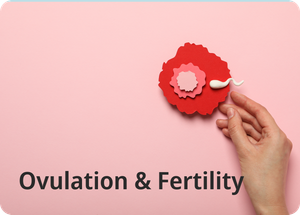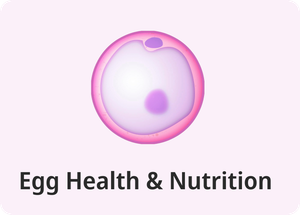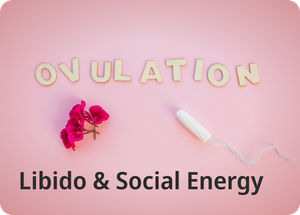During the menstrual cycle, the ovulation phase is often described as nature’s moment of brilliance. At this point, rising estrogen and luteinizing hormone levels prepare the body for a possible pregnancy, but the effects extend far beyond biology. Women often report heightened confidence, improved mood, and a sense of inner radiance. These changes are not accidental; they are deeply rooted in hormonal physiology. According to the American College of Obstetricians and Gynecologists, estrogen influences neurotransmitters such as serotonin and dopamine, which regulate both mood and motivation.
This biochemical environment translates into an emotional state where self-assurance flows more easily. Many women feel more willing to take risks, initiate conversations, and express themselves clearly. The ovulation window, therefore, is not only about fertility but also about embracing one’s voice.
Communication during ovulation often feels smoother and more instinctive. Estrogen enhances verbal fluency, memory recall, and emotional recognition. A study published in Psychoneuroendocrinology highlighted that women in their ovulatory phase were more expressive and persuasive in social interactions compared to other phases. This is one reason why negotiations, interviews, or presentations often feel more natural and effective during this time.
Body language also changes subtly. Increased estrogen improves skin glow, energy levels, and even posture. Non-verbal cues, such as maintaining eye contact and smiling more often, become easier to sustain. These signals are powerful tools in both personal and professional interactions, allowing women to connect with others more deeply.
The ovulation phase is considered the “social butterfly” stage of the cycle. Many women feel drawn to group activities, networking opportunities, or creative collaborations. This is because estrogen and luteinizing hormone not only support fertility but also influence reward pathways in the brain, increasing the desire for connection.
Harnessing this energy can be transformative. Planning social events, hosting gatherings, or engaging in team-based projects during this phase often feels more fulfilling. Schools and workplaces could also benefit from recognizing these cyclical shifts, encouraging women to schedule high-engagement activities when their natural energy is at its peak.
Confidence during ovulation is not just about outward expression; it is also about how women perceive themselves. Self-image often improves due to a combination of elevated mood, clearer skin, and higher energy levels. This is a powerful reminder that confidence is multifaceted: rooted in biology, but also shaped by mindset.
To build on this foundation, practices like journaling, affirmations, or even mindful meditation can strengthen self-esteem. By documenting successes or setting personal goals during this time, women can carry forward that sense of capability into other phases of the cycle. In this way, ovulation serves as a natural confidence coach.
Good communication is more than words; it is about creating understanding. During ovulation, many women find it easier to empathize, listen, and respond thoughtfully. This phase can be a valuable opportunity to strengthen relationships, resolve conflicts, or initiate meaningful conversations.
For example, difficult discussions with a partner or brainstorming sessions at work may feel less daunting during ovulation. The heightened social awareness and verbal ease create a supportive environment for dialogue. This is a reminder that communication is not about perfection but about timing and presence.
Making the most of this phase involves both awareness and intention. Recognizing the natural rise in confidence and communication skills is the first step. Here are some ways to channel this energy:
While hormones play a central role, lifestyle choices can enhance or hinder their effects. Eating foods that stabilize energy, such as complex carbohydrates, lean proteins, and healthy fats, supports sustained confidence throughout the ovulation phase. Hydration is equally important, as dehydration can mimic fatigue and cloud mental clarity.
Exercise also acts as a confidence booster. Cardio and strength training during this phase often feel more effortless because energy levels are naturally higher. Activities such as group workouts, dance classes, or yoga sessions align well with the desire for social connection.
Sleep remains essential, even in this high-energy phase. Prioritizing restful sleep ensures that communication skills remain sharp and mood remains balanced.
It is important to remember that the ovulation phase is a peak, not a permanent state. Confidence and communication skills may feel enhanced now, but they fluctuate naturally across the cycle. The goal is not to chase constant highs but to recognize and work with these rhythms.
By becoming aware of the ovulation phase’s unique strengths, women can align their schedules, set realistic goals, and approach social or professional tasks with greater ease. Instead of resisting hormonal changes, embracing them allows for a more balanced and empowered approach to life.
Understanding ovulation in the context of the entire menstrual cycle provides perspective. While menstruation may emphasize rest and renewal, and the luteal phase may highlight introspection, ovulation offers a window of expression and connection. Each phase has value, and together they create a rhythm that can guide women through personal and professional growth.
Communication, confidence, and connection during ovulation are not simply fleeting advantages. They are reminders of the body’s inherent wisdom. By learning to align with these natural rhythms, women can navigate life with greater self-acceptance and strength.
About PeriodSakhi
PeriodSakhi is your trusted companion for understanding your menstrual health. With easy-to-use tools, it helps you track your periods, ovulation, fertility, moods, and symptoms, while providing insights into your overall reproductive and hormonal health. PeriodSakhi also serves as a supportive online community where women can share experiences, find reliable information, and access expert-backed guidance on menstrual health, PCOS, pregnancy, lifestyle, and more.
Disclaimer
The views, thoughts, and opinions expressed in this article/blog are solely those of the author and do not necessarily reflect the views of PeriodSakhi. Any omissions, errors, or inaccuracies are the responsibility of the author. PeriodSakhi assumes no liability or responsibility for any content presented. Always consult a qualified medical professional for specific advice related to menstrual health, fertility, pregnancy, or related conditions.
Start the conversation
No comments yet. Start the conversation by leaving the first comment!




